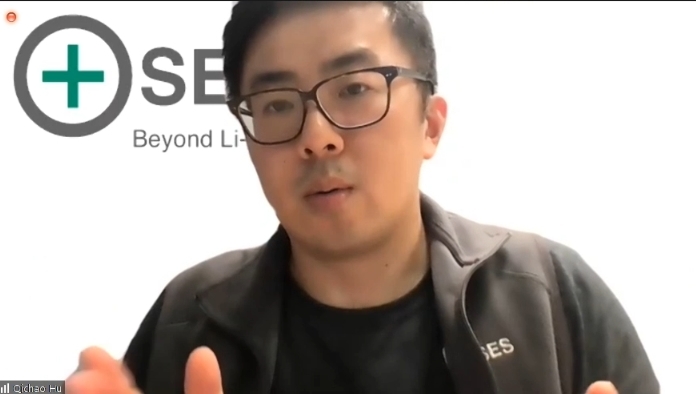SES lithium-metal batteries promising, but charging time, cycle issues unresolved
By Kim Byung-wookPublished : July 21, 2021 - 18:30

The next-generation lithium-metal batteries of Singapore-based battery developer SolidEnergy Systems show potential to replacing lithium-ion batteries, but major technological challenges remain for their commercialization, including slow charging time.
During an online press conference on Wednesday, SES founder and CEO Dr. Qichao Hu shared the firm’s progress on lithium-metal batteries and compared them with those of its competitors QuantumScape and SolidPower, claiming that SES is 18 months to 2 years ahead in terms of energy density, lifespan and charging time.
However, at a closer look, SES lithium-metal batteries are still not ready to be loaded on EVs.
According to Son Yong-kyu, chief technology officer at SES, the firms’ lithium-metal samples can maintain 70 percent performance after 779 cycles and 90 percent performance after 550 cycles, but such results were achieved under the condition that the battery samples were charged slowly at 2 to 6 hours. Lithium-ion batteries mounted on EVs offer 1,000 to 2,000 cycles.
“The samples with capacity between 4 ampere-hours and 6 ampere-hours were charged at 1-2 amperes,” Son said.
Son added that its lithium-metal batteries are capable of rapid charging, up to 80 percent capacity in 15 minutes, but didn’t disclose how many cycles the lithium-metal batteries can endure when rapidly charged.
SES aims to solve such issue and commercialize the lithium-metal batteries by 2025.
During the press conference, the CEO hinted a potential lithium-metal battery factory in Korea for Hyundai Motor electric vehicles.
“The plant is going to be near the carmaker. If we work with Korean carmaker, the plant will likely be in Korea or in Asia,” Hu said. Earlier this month, Hyundai Motor reportedly signed a $100 million share purchase agreement with SES.
SES started off as an in-house startup at Massachusetts Institute of Technology and spun off in 2012. With its leading lithium-metal battery technology, the firm has secured investments worth $2.7 billion so far, major investors including SK, General Motors, Hyundai Motor Group, among others. Now, SES is preparing a listing on the New York Stock Exchange.
Lithium-metal batteries and lithium-ion batteries have four key components -- cathodes, anodes, separators and electrolytes.
While lithium-ion batteries use graphite mixed with silicon for anodes, the negative side, lithium-metal batteries, as the name suggest, use lithium metal.
Lithium-metal anodes offer energy density 10 times greater than graphite anodes. This allows lithium-metal batteries to be approximately 30 percent more powerful than lithium-ion batteries.
What blocked lithium-metal batteries from commercialization was dendrites. When batteries are charged and discharged over time, lithium ions pile up to form needles called dendrites. When these needles elongate enough to puncture separators -- thin plastic walls diving cathodes and anodes -- short circuits occur, setting batteries on fire. Lithium-metal anodes are more susceptible to dendrites than graphite anodes.
According to SES CEO, the firm has solved the dendrite issue with three tactics.
“We have addressed the issue of lithium-metal dendrites in the following way. One, we are using a high concentration solvent-in-salt electrolyte. That changes the way dendrites grow. Dendrites are now much softer and much denser in the high concentration dendrite,” Hu said.
The CEO further added that SES can prevent dendrites by coating the space between the separator and the anode. Also, SES algorithms can detect dendrites and send warnings to users.



![[Exclusive] Korean military set to ban iPhones over 'security' concerns](http://res.heraldm.com/phpwas/restmb_idxmake.php?idx=644&simg=/content/image/2024/04/23/20240423050599_0.jpg&u=20240423183955)

![[Graphic News] 77% of young Koreans still financially dependent](http://res.heraldm.com/phpwas/restmb_idxmake.php?idx=644&simg=/content/image/2024/04/22/20240422050762_0.gif&u=)



![[Pressure points] Leggings in public: Fashion statement or social faux pas?](http://res.heraldm.com/phpwas/restmb_idxmake.php?idx=644&simg=/content/image/2024/04/23/20240423050669_0.jpg&u=)









